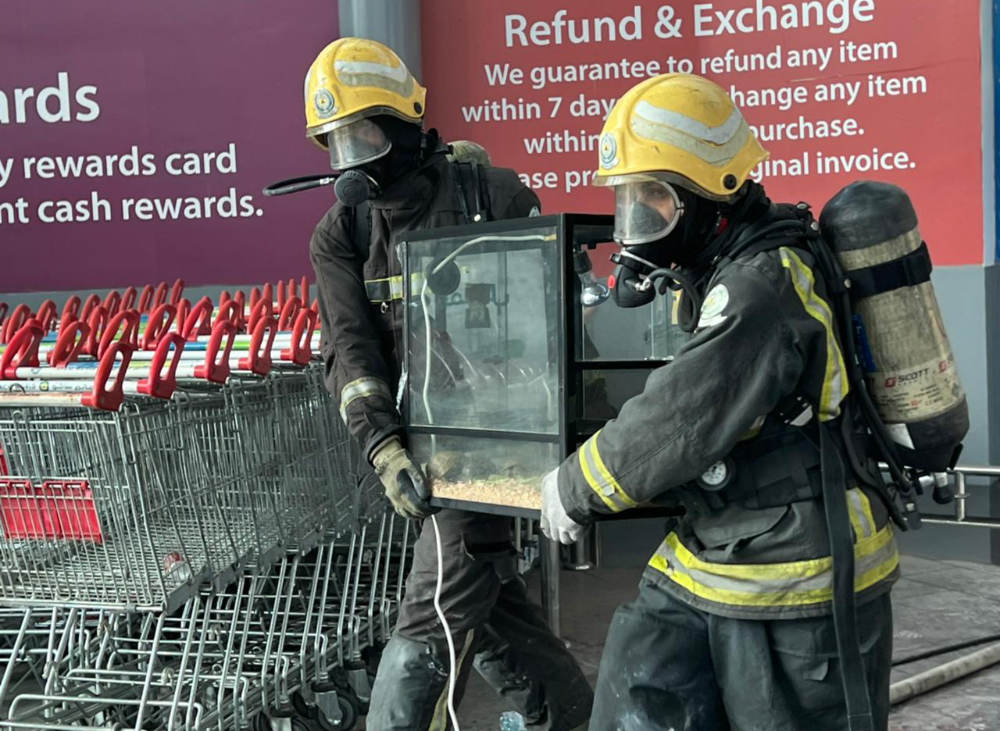RIYADH: Pet owners were relieved after their animals were rescued from a massive fire that broke out Friday inside Alkhobar’s Dhahran Mall in eastern Saudi Arabia.
A Civil Defense crew in Alkhobar rescued animals including cats, dogs and fish from Pets Houses, a pet supplies store in the largest commercial complex in the Eastern Province.
The animals were transported during daylight hours after a fire that started on the complex’s roof was put out.

We always find these (Civil Defense) heroes providing assistance and saving lives, says Badr S. Al-Turaif, General manager Rahmah Animal Welfare Association
According to a Civil Defense source, it is part of firefighters’ job in such circumstances to perform search and rescue operations at the scene to ensure that no one is trapped inside and that any animals are rescued.
The same source told Arab News that firefighters evacuated the pets to a safe location outside the mall before the animals were returned to their owners.
Nawaf Al-Mandeel, general manager of Pets Houses, said that “the shock was tremendous at Pets Houses,” following the fire that broke out at Dhahran Mall, where one of the company’s branches is located.

Firefighters rescuing animals from a pet shop near the conflagration which broke out in Dharhan Mall and caused a lot of damage while a fireman appears to carrying a fish tank. (Supplied/Saudi Civil Defense)
Al-Mandeel said that Pets Houses does its best to afford care and a decent life for the many pets at the branch located in Dhahran Mall. Pet owners regularly come to the branch, he said, to purchase supplies and learn how to breed and care for their pets as part of the family.
All animals are subject to periodic medical checkups by Pets Houses’ veterinarian clinic, which provides for all their needs, including hygiene, he said.
“We were shocked by the news of the fire that morning. We contacted the authorities and alerted them to the presence of pets inside our branch located inside the complex, and they responded immediately,” Al-Mandeel added.

Firefighters rescuing animals from a pet shop near the conflagration which broke out in Dharhan Mall and caused a lot of damage while a fireman appears to carrying a fish tank. (Supplied/Saudi Civil Defense)
He described the waiting periods as “excruciating” until he received the welcome news that all the animals at the branch had been rescued and transported safely and without any injuries, thanks to the efforts of the Civil Defense “heroes.”
“The team brought the animals to our veterinary clinic swiftly to check on their health. The medical team confirmed the safety of all the animals,” he said.
Badr S. Al-Turaif, general manager of Rahmah Animal Welfare Association, told Arab News that the association is in contact with the shop’s management and that the animals are in good health, adding that they had not been exposed to either fire or fumes as the shop is located relatively far from the fire site.

Nawaf Al-Mandeel, General Manager of Pets Houses. (Supplied)
“The courageous efforts of the Civil Defense team are not surprising,” Al-Turaif said. “We always find these heroes at the center of incidents, providing assistance and saving lives.”
Al-Turaif urged pet store owners to implement the preventive measures outlined by the Civil Defense to avoid tragedies in the future. These include setting fire alarms, developing an emergency and evacuation plan, ensuring adequate ventilation, designing the shop in a way that allows for the implementation of these measures, and creating an appropriate environment for animals so that their health and safety are not jeopardized.
































